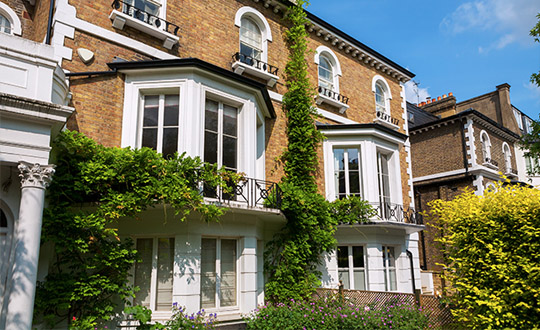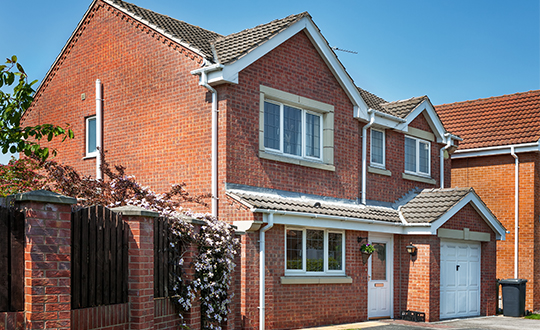Can I Release Equity To Purchase A Second Home?

The age-old advice to put your money into bricks and mortar is generally good advice but just because you own your home, doesn’t mean that you have the capital free to put a deposit down on a second property.
The great news is that owning your property could be the gateway that you need when acquiring a second home.
In this guide we take a deep dive into the options available to homeowners that want to buy a second home.
The UK Property Market at a Glance
In 2021 alone, UK property prices rose by more than 9.8%.
For homeowners this is fantastic news as the amount of equity you hold increases as house prices increase.
With such big increases in such a short space of time, property owners are finding that their homes are their largest asset.
Unfortunately, homes aren’t considered a cash asset, and to realise their value, the cash needs to be freed up, either by borrowing against the property or equity release.
Releasing Equity to Buy Another Property
One of the primary reasons that you might want to use the cash locked up in your homes is to buy a second property.
A second property can serve all kinds of purposes.
- As a Buy to Let
- Holiday Homes
- For Housing Dependents
- Overseas Property
- Second Homes
Currently there are two ways you can free up cash in order to put a deposit down on a second property remortgaging the existing property or by using equity release.
Remortgaging to Buy a Second Home
Remortgaging can be a good option for certain people, but there are a number of criteria that can prove tricky. The key issue many buyers face when remortgaging for a second home is eligibility.
There are all sorts of hurdles to jump when it comes to remortgaging for a second home including age, affordability, and credit profile.
- Age lenders have maximum ages they will allow you to borrow to, this means that if you’re approaching retirement age, you might not get the mortgage term required to make the loan affordable.
- Affordability you will need to demonstrate to the lender that you can pay back the amount you’re remortgaging for alongside any new mortgage on the second property.
- Credit Profile Your credit profile and history could impact whether you’re able to remortgage. It could also impact the interest rate offered by a lender in some cases.
While remortgaging is initially attractive, many find themselves in a position where they’re either unable to borrow the money or the financing is too expensive to make it feasible.
Understanding Second Home Mortgages
Once you have remortgaged your property, unless there is a substantial amount of equity, you will need a second mortgage to afford a second property.
The two most common types of mortgage that lenders offer on second properties are a Buy to Let mortgage (interest-only) and a repayment mortgage.

To qualify for a Buy to Let mortgage you will need a larger deposit compared to a repayment mortgage and you will need to demonstrate that the rental income is greater than the monthly interest payment.
If you’re not thinking of renting out the second property, a repayment mortgage is applicable, and you will need to factor in the monthly costs of the existing remortgage alongside the costs of the new mortgage.
Equity Release
Equity release is a different product to a traditional remortgage.
It is particularly attractive if you’re older and unable to meet remortgage criteria due to your age or income (pensions etc.).
Equity release is available to homeowners over the age of 55 and is sometimes called a ‘Lifetime Mortgage’.
It allows you to take out some of the money tied up in your property. The equity released is tax-free and paid as a lump sum.

An equity release differs significantly to a standard mortgage (despite the Lifetime Mortgage moniker) and there are no mandatory monthly payments to make.
This is a great advantage if you’re currently drawing on your pension as your income won’t be affected by an equity release.
There is still an interest payment, but this is rolled up and is paid for by the sale of the property when you pass away (or if you have to move into a long-term care setting). If you’re looking to reduce interest owed on the equity release, you can make interest payments as well in most cases.
Most Equity Release lenders will also allow you to make overpayments of typically up to 10% of the outstanding balance per annum without incurring early repayment charges.
Free consultations are available in the UK.
Get Started NowThe Process of Buying a Second Home with Equity Release
Releasing equity to buy another property can be confusing, especially when you factor in some of the costs associated with owning a second property.
You will need to discuss your circumstances with an equity release advisor who will be able to give bespoke advice about equity release.
Calculating the Amount of Equity in a Property
It is straightforward to work out how much equity you have. If you own the property outright the amount of equity you have will be 100%.
If there is a mortgage on the property the equity will be the property value minus the total amount outstanding on the mortgage.
For example, a £330,000 property with a £140,000 mortgage would have £190,000 in equity.
Releasing Equity to Buy Second Home Eligibility
Equity release companies prefer to release equity from homes that are owned outright, although there are circumstances where equity release will be possible on a mortgaged property.
Typically, this is when the outstanding mortgage on the property is small in relation to the amount of equity you have.
An equity release advisor will be able to outline whether you’re eligible for releasing equity to buy a second home.
Purchasing the Second Home
Ideally, you will be looking to purchase a second property that is valued less than the amount of equity they will release.
If the second property is valued higher than the amount of equity being released, you should consult a mortgage adviser about the best way to proceed.

As mentioned above, mortgages can be difficult to obtain if a borrower is 55 years of age or older. A mortgage term could take an older borrower beyond retirement age and a lender must factor in whether your pension payments will cover the monthly repayment of the loan.
Lenders also operate maximum ages on mortgages with many capping the term at 70 years old (and a few going beyond that). The shorter the term on a mortgage, the higher the monthly repayment.
Associated Costs to Consider
Alongside the complexities of getting a mortgage at an older age, there are also a number of additional costs to consider when you’re buying a second property.
Stamp Duty
A big financial barrier when buying a second home in the UK is stamp duty. This is even more so when buying a property that doesn’t serve as a main residence. You will need to pay an additional 3% on top of any stamp duty that is already owed for second homes.
Fortunately, the government provides an easy calculator that you can use to determine your stamp duty liability.
Purchasing a second property with a value of £250,000 will attract £10,000 in stamp duty. This is a £7,500 increase on the £2,500 typically charged for a primary residence property with the value of £250,000.
Property Survey
Buying property in the UK is conducted under the principle of caveat emptor, commonly known as ‘buyer beware.’ This means that when buying a property in the UK it is your responsibility to verify the property you’re buying is suitable for your needs.
Because caveat emptor is all encompassing, it is prudent for you to contract with a surveyor to check the property for defects or issues that could cause problems down the line.
Property surveys range in cost from a basic survey at around £300 to a comprehensive survey at around £1400.
The general rule with surveys is that ‘you get what you pay for’ and paying for a comprehensive survey will be more thorough and highlight more problem areas if there are any.
Legal Fees
Land Registry now makes it straightforward for buyers and sellers to transfer deeds electronically.
But you will need to make sure that everything contained in the deeds is correct and that any covenants are highlighted to you before you exchange contracts.
Conveyancers facilitate the property sale, and you will need to hire one to exchange contracts and complete a property purchase.
A conveyancer will also deal with your stamp duty liability as well, ensuring it is all paid before the purchase is completed. Conveyancing fees vary greatly depending on the property value, the type of property, and where it is in the UK.
If you’re using a mortgage product to purchase the second property, a lender will normally nominate an approved conveyancer. If you’re not using a mortgage product, you will have to seek out your own conveyancer.
Second Home Costs Overview
Buying property in the UK isn’t a cheap endeavour and there are costs associated with even the most bog-standard purchase.
When buying a second home in the UK, the cost of purchasing is inflated by stamp duty. This difference in cost can be extremely off-putting as the additional 3% is significant in most cases.
What Our Clients Have To Say
Is Equity Release a Good Option for Me?
There are a number of things you should consider when deciding if equity release is a good option. This is especially true if the purpose is releasing equity to buy another property. You should seek advice from a whole-of-market mortgage broker, such as Boon Brokers, to establish whether Equity Release is suitable for your situation.
Benefits of Releasing Equity to Buy Second Home
Many older buyers find themselves struggling to obtain a suitable mortgage, or worse still are shut out of the mortgage market completely due to age, income, and affordability.
Releasing equity to buy another property is particularly good if the second property is of less value than the amount of equity that is being released.

It also gives older buyers a financial alternative to the often-problematic traditional mortgage market.
Drawbacks of Equity Release
At time of writing (2022) the property market is buoyant and house prices have been rising rapidly since 2004 according to Halifax. But past track record isn’t an indicator of future success, and the market could turn.
Releasing equity in a booming market means that you get more ‘bang for your buck’ but if the market turns, you could find that negative equity impacts the amount that is repaid eventually.
Many equity release providers offer you a ‘no negative equity’ guarantee which offers those releasing equity more protection in such a scenario but this doesn’t mean that costs won’t completely erode the value of your home.
If you’re looking to leave money to family or friends in the event of your death, releasing equity should be treated with caution as there may be no money left in the property when the estate is settled, and the loan is repaid.
Drawbacks Aside from Equity Release
Buying a second property is almost always a costly endeavour for one reason or another. This is true whether you purchase outright from savings, use a mortgage product or equity release.
Conclusion
When buying a second home, you should carefully consider the totality of the circumstances and if you’re considering using equity release, you will need to consult an equity release adviser.
Equity release advisers are qualified to give expert advice if you’re looking to free up cash in your property. They will ensure you get the best equity release deal.
You will also need legal advice when completing an equity release, something an equity release adviser will provide more information about.
Contact Boon Brokers to discuss your equity release options now.
Boon Brokers are a fee-free, whole-of-market mortgage, insurance and equity release brokerage. Feel free to contact us for a free consultation.
Gerard BoonB.A. (Hons), CeMAP, CeRER
Gerard is a co-founder and partner of Boon Brokers. Having studied many areas of financial services at the University of Leeds, and following completion of his CeMAP and CeRER qualifications, Gerard has acquired a vast knowledge of the mortgage, insurance and equity release industry.Related Articles
- Remortgage Or Equity Release
- How Does The ERC Protect You
- What Happens On Death With Equity Release?
- Releasing Equity To Help Child Buy Their First Home
- How Much Equity Can I Release?
- How Does Equity Release Affect Your Family
- How Much Does Equity Release Cost?
- Equity Release Companies To Avoid
- What Is Home Reversion?
- Can I Sell My House If I Have Equity Release?
- Equity Release For A Buy To Let Mortgage
- What Is A Lifetime Mortgage?
 Authorised and regulated by the Financial Conduct Authority. No: 973757
Authorised and regulated by the Financial Conduct Authority. No: 973757




